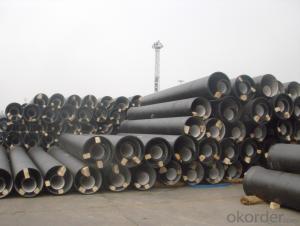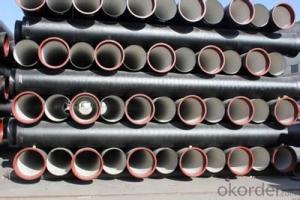DUCTILE IRON PIPES K9 DN125
- Loading Port:
- China Main Port
- Payment Terms:
- TT OR LC
- Min Order Qty:
- -
- Supply Capability:
- -
OKorder Service Pledge
OKorder Financial Service
You Might Also Like
Ductile Iron Cast Pipe is without any defects compare with tradition casting tech, which has many advantages particularly as follow:
(1) High density. In the "vertical upward casting" process, the melt iron of centre liquid column in center crystallizer is continuously feeding for volume shrinkage caused by condensation tube at outer circumference , which lead to be free of shrinkage porosity.
(2) High purity. When melt iron pouring, the mixed impurities such as gas, dross, sand grain which are lighter than melt iron could be eliminated at furnace mouth, its impossible to enter into the crystallizer through the channel, so the melt iron into the crystallizer is very pure.
(3) Strength with toughness. The cooling speed provided by continuous crystallizer is 30 times than sand casting and 5 times than centrifugal casting, and doesn't produce white iron, the eutectic cell volume of continuous cast iron is one eighth to one tenth compare with traditional cast iron. The density of graphite nodule in ductile iron can reach 300-700 pcs/mm2. Therefore, all reason above improve the strength and toughness of continuous cast iron.
(4) Free machining. The high speed cooling make the hardening phase (such as boride, steadite) not appear like reticular, massive or thick, but diffuse like fish bone and pane in shape, moreover, there are tiny graphite flakes inlaid hardening phase. It's free machining in BrinellHardness the range of 250-300HB. However, the Brinell Hardness of 250 is top limit to common metal materials.
(5) Uniform composition of tube wall. The convection mixing of liquid column caused by marching type drawing in crystallizer make the composition of tube wall well-distributed, and concentration gradient very little.
(6) High productivity. To the wall thickness of tube under 10mm, the speed of continuous casting is 1 meter/min, to the wall thickness of tube under 20mm, the speed of continuous casting is 0.5 meter/min, which is high efficiency that centrifugal or other casting tech couldn't reach.
- Q:Why is the cast iron tube lined with cement? Under what circumstances are ductile iron pipes lined with cement, and under what circumstances do not have to be lined with cement?
- Cement lining to protect water quality, reduce loss, improve the service life of the pipeline ductile, ductile iron pipes are generally lined, which the en545 standard specifies the quality of what kind of what kind of cement.
- Q:Can ductile iron pipes be used for bridge drainage systems?
- Yes, ductile iron pipes can be used for bridge drainage systems. Ductile iron pipes are known for their strength, durability, and resistance to corrosion, making them suitable for various applications, including bridge drainage systems. They can effectively handle the flow of water and withstand the weight and pressure of vehicles passing over the bridge.
- Q:Are ductile iron pipes suitable for underground applications?
- Yes, ductile iron pipes are suitable for underground applications. They are known for their durability, strength, and resistance to corrosion, making them ideal for use in underground environments where they may be exposed to moisture and soil conditions. Additionally, ductile iron pipes have a long lifespan and can withstand heavy loads, making them a reliable choice for underground applications such as water and sewage systems.
- Q:How do ductile iron pipes perform in high-pressure applications?
- Ductile iron pipes are highly renowned for their exceptional strength and durability, making them incredibly suitable for applications with high pressure. These pipes are specifically designed to endure immense internal and external pressures, making them well-suited for both underground and above-ground installations where high-pressure conditions are anticipated. One of the primary advantages of utilizing ductile iron pipes in high-pressure applications lies in their capacity to resist cracking or bursting. The material's inherent ductility enables it to absorb and distribute pressure evenly, significantly reducing the risk of failure under high-pressure circumstances. Consequently, ductile iron pipes are a dependable choice for water supply systems, oil and gas pipelines, and other demanding applications subject to substantial pressure. Moreover, ductile iron pipes exhibit outstanding corrosion resistance properties, further enhancing their performance in high-pressure environments. These pipes are typically coated with a protective layer, such as cement mortar or epoxy, which serves as a barrier against corrosion. By preventing the formation of rust or scale inside the pipe, this protective coating ensures smooth flow and upholds structural integrity even under high-pressure conditions. Furthermore, ductile iron pipes possess a remarkable tolerance for external loads, including soil pressure, traffic loads, and various other forces. This exceptional strength enables them to withstand the additional stress often encountered in high-pressure applications, guaranteeing the long-term reliability and performance of the pipe system. In conclusion, ductile iron pipes offer exceptional performance in high-pressure applications. Their strength, durability, corrosion resistance, and ability to withstand external loads make them a reliable choice for a wide range of industries and infrastructure projects where high-pressure conditions are a significant concern.
- Q:How does ductile iron pipe handle traffic loads and vibrations?
- Ductile iron pipe is known for its excellent strength and flexibility, allowing it to efficiently handle traffic loads and vibrations. Its superior durability and resilience enable it to withstand heavy vehicle traffic without experiencing significant deformation or damage. Additionally, the material's inherent vibration-damping properties help to minimize the transmission of vibrations caused by traffic, ensuring a smoother and quieter flow of traffic. Overall, ductile iron pipe is a reliable and robust choice for managing traffic loads and vibrations effectively.
- Q:What are the different methods for anchoring ductile iron pipe?
- Depending on the specific application and requirements, there are various methods available for anchoring ductile iron pipe. One method involves the construction of concrete thrust blocks around the pipe at points where there are changes in direction or diameter. These blocks resist the thrust forces from the flowing water and prevent pipe movement. Another option is to install concrete collars or rings at regular intervals along the pipe. These collars provide additional support and prevent lateral movement. They are created by pouring concrete into a pre-made mold surrounding the pipe. Pipe clamps are metal brackets that can be attached to the pipe and anchored to a structure or support system. They come in different sizes and designs, allowing for flexible installation and adjustment as needed. Pipe restraints are specifically designed devices to restrict the movement of ductile iron pipe. Typically, they consist of a metal band or collar tightened around the pipe and attached to a concrete structure or anchoring system. The bell and spigot joint itself can serve as a means of anchoring the pipe. The bell end of one pipe fits over the spigot end of another, creating a tight connection that resists movement. Properly compacted soil surrounding the pipe can also provide some level of anchoring. The soil should be compacted in layers around the pipe to ensure stability and prevent movement. It is important to consider factors such as soil conditions, pipe diameter, operating pressure, and location when selecting the appropriate anchoring method. Consulting industry standards, guidelines, and a qualified engineer is crucial in determining the best anchoring method for a specific ductile iron pipe installation.
- Q:What is the minimum pipe diameter of cast iron pipe?
- According to the casting method, it is divided into continuous cast iron pipe and centrifugal cast iron pipe, in which the centrifugal cast iron pipe is divided into sand mould and metal type two kinds. Divided into gray cast iron pipe and nodular cast iron pipe according to different material. According to the interface form, it is divided into flexible interface, flange interface, self anchored interface, rigid interface and so on. Among them, the flexible iron pipes rubber sealing ring; flange interface cast iron pipe flange fixed in the rubber pad, the flange gasket sealing; rigid interface cast iron pipe socket is large, straight pipe is inserted, sealed with cement, this technology has been basically eliminated.
- Q:Can ductile iron pipe be used for fire protection systems?
- Yes, ductile iron pipe can be used for fire protection systems. Ductile iron pipe has excellent resistance to fire, making it a suitable choice for fire protection applications. It is known for its strength, durability, and ability to withstand high temperatures, making it reliable for transporting water or other fire suppression agents.
- Q:Method for joining cast iron pipes
- The connection between the pipe and the pipe adopts the form of socket type or flange disk interface. According to the function, it can be divided into two kinds: flexible interface and rigid interface. The flexible interface is sealed with rubber ring, which allows a certain degree of corner and displacement, so it has good seismic resistance and tightness. It is easy and quick to install than rigid interface. It has little labor intensity according to the casting method.
- Q:What are the advantages of using ductile iron pipe over concrete pipe?
- There are several advantages of using ductile iron pipe over concrete pipe. Firstly, ductile iron pipe has a higher strength-to-weight ratio compared to concrete pipe. This means that it can withstand higher pressure and loads while being lighter in weight. This makes it easier to handle and install, reducing labor costs and time. Secondly, ductile iron pipe has superior corrosion resistance compared to concrete pipe. It is less likely to rust or degrade over time, which increases its lifespan and decreases the need for frequent repairs or replacements. This makes it a more cost-effective option in the long run. Additionally, ductile iron pipe has better flexibility and resilience compared to concrete pipe. It can withstand ground movement, settling, and other environmental factors without cracking or breaking. This makes it more durable and less prone to damage, reducing maintenance and repair costs. Moreover, ductile iron pipe has a smoother interior surface compared to concrete pipe. This results in improved flow characteristics and reduced friction, allowing for more efficient transportation of fluids. It also minimizes the risk of clogs or blockages, ensuring uninterrupted flow. Furthermore, ductile iron pipe is highly versatile and can be used in a wide range of applications. It is suitable for both above-ground and underground installations, making it ideal for various infrastructure projects such as water supply systems, wastewater treatment plants, and industrial applications. Overall, the advantages of using ductile iron pipe over concrete pipe include its higher strength-to-weight ratio, superior corrosion resistance, better flexibility and resilience, smoother interior surface, and versatility. These benefits make it a reliable and cost-effective choice for various infrastructure projects.
1. Manufacturer Overview |
|
|---|---|
| Location | |
| Year Established | |
| Annual Output Value | |
| Main Markets | |
| Company Certifications | |
2. Manufacturer Certificates |
|
|---|---|
| a) Certification Name | |
| Range | |
| Reference | |
| Validity Period | |
3. Manufacturer Capability |
|
|---|---|
| a)Trade Capacity | |
| Nearest Port | |
| Export Percentage | |
| No.of Employees in Trade Department | |
| Language Spoken: | |
| b)Factory Information | |
| Factory Size: | |
| No. of Production Lines | |
| Contract Manufacturing | |
| Product Price Range | |
Send your message to us
DUCTILE IRON PIPES K9 DN125
- Loading Port:
- China Main Port
- Payment Terms:
- TT OR LC
- Min Order Qty:
- -
- Supply Capability:
- -
OKorder Service Pledge
OKorder Financial Service
Similar products
New products
Hot products
Related keywords



























